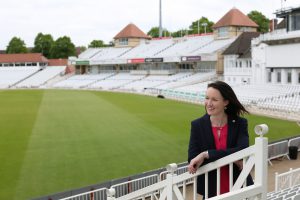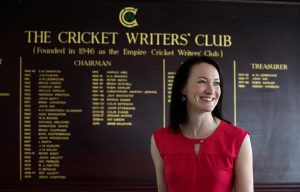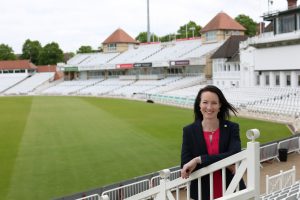December 6, 2017, by Liz Cass
Howzat! Nottingham alumna commentates on the Ashes
 Until 1976 women were not allowed to step on the outfield at Lord’s, never mind play cricket on it or commentate from it. Fast forward more than 40 years and we see England’s women victoriously raising the Cricket World Cup, with Britain’s first female cricket commentator, Alison Mitchell (Geography, 2001) relaying the news to millions worldwide. As she commentates on the Ashes from Australia we share her views on all things cricket and the unusual geography dissertation which kick-started it all.
Until 1976 women were not allowed to step on the outfield at Lord’s, never mind play cricket on it or commentate from it. Fast forward more than 40 years and we see England’s women victoriously raising the Cricket World Cup, with Britain’s first female cricket commentator, Alison Mitchell (Geography, 2001) relaying the news to millions worldwide. As she commentates on the Ashes from Australia we share her views on all things cricket and the unusual geography dissertation which kick-started it all.
The clatter of studs on concrete, West Indian fast bowlers with their heads in the clouds and ‘beefy’ Botham smashing sixes out of the park – a six-year-old Alison Mitchell was smitten with cricket back in 1986.
“It was part of our family life from a very early age. Dad played for Old Wellingburians so most Saturdays my brother and I would go to watch him, play our own game in the outfield or learn how to score. Watching cricket on TV and hearing voices like Richie Benaud and Tony Greig was a real family event. I just loved it,” recalls Alison, now a member of the BBC’s famous Test Match Special team, which celebrated its 60th birthday earlier this year.
This early knowledge and enthusiasm would prove invaluable when, years later, she succeeded in breaking through one of the toughest glass ceilings in sport – a woman writing and talking about cricket. But it was no easy journey – while at University, Alison spent her summer months holed up in the famous Trent Bridge Library, knee-deep in Wisden Almanacks, carrying out painstaking research for her obscurely-named socio-cultural geography dissertation The Impact of Television on the Cultural Geography of English Cricket 1995-2000.
“I filled my brain with the sport. I just couldn’t get enough and I began to realise what cricket meant to me. I believe the dissertation was huge in getting me taken seriously enough to get in the door because there were unspoken assumptions that a woman wouldn’t know as much about cricket as a man. That dissertation showed I understood cricket, its culture, history, and all its nuances.”
 Following your passion
Following your passion
Channel Four considered her blend of qualitative research, great networking and work experience in local sport radio, and gave her a job as a runner on their Ashes coverage. She also worked part-time at Trent Bridge in sales and marketing for Nottinghamshire County Cricket Club, giving her new insights into different aspects of the sport.
From there her rise was swift. After gaining a postgraduate diploma in Broadcast Journalism at Falmouth College of Arts, she covered cricket for the BBC Asian Network and first broadcast for Radio Five Live in 2003, just two years after graduating.
She cut her commentary teeth on county cricket before covering England tours, eventually making her full England commentary debut in 2007.
The most significant breakthrough came when Test Match Special listeners heard her commentate ball-by-ball on a five-day game – the first women to do so. It was 2014 and the same year that she was voted Sports Broadcaster of the Year by the Sports Journalists Association.
“Joining the iconic TMS team felt like a natural progression. My voice was already known by the listeners because I’d worked my way up over the years but I still used to meet people who would ask ‘Do you actually like cricket?’ – as if the BBC had plucked a woman at random, told her a little bit about cricket and just put her on air.”
Though cricket is her passion, at University it was hockey which occupied her time, becoming club captain in her second year and enjoying every minute of student life.
“There was just something about the Nottingham feel. The reputation went without saying but the campus was green and felt friendly and I had an overwhelming sense of ‘yes, I can see myself here’. It felt as if my life revolved around the social side of the hockey club and that gave structure to my week – training on Monday, Indoor hockey on Tuesday, a BUSA (now BUCS) match on Wednesday, training again on Thursday and Friday night off, which generally meant a late night at the Zone, beneath the Palais”.
Juggling work experience at her local BBC branch during her holidays and making regular appearances on URN (University Radio Nottingham) around her

hockey playing schedule, one night in the union bar also shaped Alison’s determination to succeed as a professional sport journalist on her own terms.
“I decided to let my experience say it all. I never wanted to stand out as a woman but instead, I let my commentating speak for itself. I thought about what I wore and how I presented myself – it was quite a few years before I wore a skirt or dress to work. I didn’t want anyone in the press box to looking at me in any other way other than as a journalist. I was determined to prove myself by what I said and what I wrote”
And Alison is not alone anymore. Former women players and sport journalists are following in her footsteps, filtering through to the commentary box and the pundit’s seat.
“Things are happening now – many barriers have been broken, and I hope I’ve helped make the path easier for those who are now sharing the cricket commentary box with me.
“London 2012 was certainly a breakthrough moment. We saw strong, confident sportswomen not afraid to give their opinion.
“Women’s sport itself is being taken more seriously and the profile of many sportswomen has been boosted to the point where they are recognisable.
 “The transition to the media is therefore a natural one because these women now have a huge profile when they finish playing. It’s a very positive shift.
“The transition to the media is therefore a natural one because these women now have a huge profile when they finish playing. It’s a very positive shift.
“While there are still barriers to be broken, it is important to celebrate the baby steps we have taken towards equality, than bemoan the distance we still have to travel.”
Giving back to Nottingham
Current students were lucky to hear Alison share her career experiences in person at a recent Leadership in Sport event, held at our new David Ross Sports Village. Alison chaired a panel of fellow alumni, giving students the opportunity to benefit from the combined wisdom and experiences of a range of successful sports professionals. Generous with her time and passionate about sport at Nottingham, Alison is also helping to advise the University on our Strategic Vision for Sport and associated £3m fundraising campaign, by participating as a volunteer on our Sports Board.
No comments yet, fill out a comment to be the first

Leave a Reply